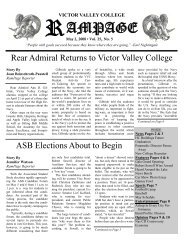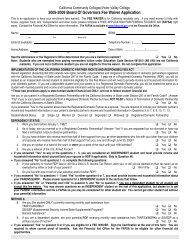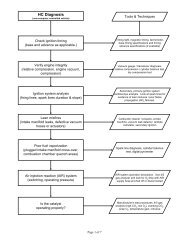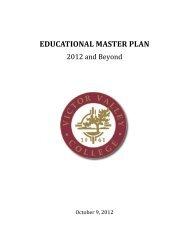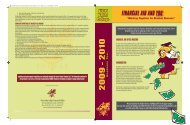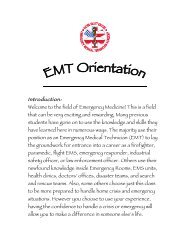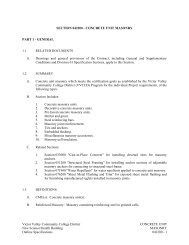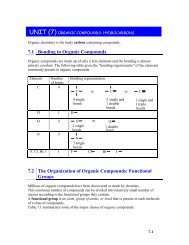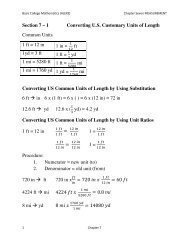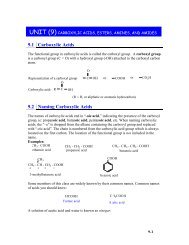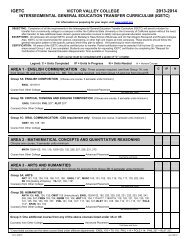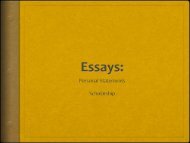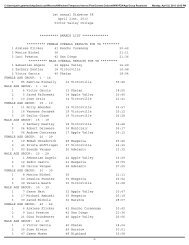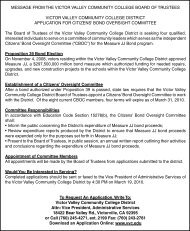Download - Victor Valley College
Download - Victor Valley College
Download - Victor Valley College
You also want an ePaper? Increase the reach of your titles
YUMPU automatically turns print PDFs into web optimized ePapers that Google loves.
PROGRAMS / COURSE DESCRIPTION<br />
MUSIC<br />
by the Transfer Center in Building 55 or make an<br />
appointment with a counselor if you have questions.<br />
• California State University, San Bernardino<br />
Music major<br />
• University of California, Riverside<br />
Music major<br />
MUSIC COURSES<br />
MUSC 100 INTRODUCTION TO MUSIC<br />
Units: 3.0 - 48-54 hours lecture. CSU, UC. (No<br />
prerequisite)<br />
This course is a general introduction to the art of music,<br />
its nature, history, materials and vocabulary. The course<br />
examines the historical and contemporary value of<br />
music to the individual and society. Consideration will<br />
also be given to structural organizations of music<br />
composition and the characteristic styles of historical<br />
periods and important individuals.<br />
MUSC 101 FUNDAMENTAL OF MUSIC<br />
Units: 3.0 - 48-54 hours laboratory. CSU, UC. (No<br />
prerequisite)<br />
A beginning study of the basic elements of music,<br />
including pitch and rhythm recognition, key signatures,<br />
intervals, time signatures, and major and minor scales<br />
and simple triads. Useful to those wishing to learn to<br />
sight read or play an instrument, and for those who wish<br />
to write music.<br />
MUSC 102 MUSIC THEORY DIATONIC PRACTICE,<br />
PART I<br />
Units: 3.0 - 32-36 hours lecture and 48-54 hours<br />
laboratory. CSU, UC. (Prerequisite: MUSC 101 or<br />
equivalent information as demonstrated by pretest.)<br />
Comprehensive theory musicianship study centering on<br />
basic four part diatonic harmonic practices. Use of triads<br />
in root position in all major and minor modes, principles<br />
of voice leading including doubling, spacing, voice<br />
ranges, part crossings, basic harmonic progression, and<br />
melodic construction. Emphasis on written and aural<br />
analysis, and creative application of concepts to musical<br />
composition. Stresses programmed instruction<br />
supported by computer and electronic teaching aids in<br />
an interactive classroom environment. Required for<br />
those majoring in music and useful to those desiring to<br />
write or arrange music for any purpose<br />
MUSC 103 MUSIC THEORY DIATONIC PRACTICE,<br />
PART II<br />
Units: 3.0 - 32-36 hours lecture and 48-54 hours<br />
laboratory. CSU, UC. (Prerequisite: MUSC 102 or<br />
equivalent information as demonstrated by exam.)<br />
Continuation of MUSC 102, comprehensive theory<br />
musician-ship study centering on basic fourpart<br />
diatonic harmonic practices. Use of triads in all<br />
positions, principles of voice leading, harmonic<br />
progression, non-harmonic tones, and melodic<br />
construction. Emphasis on written and aural analysis,<br />
and creative application of concepts to musical and<br />
electronic teaching aids in an interactive classroom/lab<br />
environment. Required for those majoring in music and<br />
useful to those desiring to write or arrange music for any<br />
purpose.<br />
MUSC 104 SIGHT SINGING LABORATORY, LEVEL I<br />
Units: 1.0 - 32-36 hours lecture and 48-54 hours<br />
laboratory. CSU, UC. (Prerequisite: MUSC 101 or<br />
equivalent information as demonstrated by pretest.)<br />
Self-paced, comprehensive, individualized training in<br />
sight singing, developing mastery in rhythmic sight<br />
reading and playing, pitch matching and matching<br />
notation to inner hearing, and notating rhythmic and<br />
melodic dictation. Drill and practice through computer<br />
generated exercises using Music Lab software on the<br />
student's own computer and practice and testing in the<br />
college Music Computer Lab. Additional practice in<br />
small group sessions as needed. Student will pass on<br />
computer five quiz levels in each of eight skills to<br />
receive credit for the appropriate course section. This<br />
course is open to anyone desiring to learn basic<br />
practical music reading skills; it is required of students<br />
taking Music Theory 102.<br />
MUSC 105 SIGHT SINGING/EAR TRAINING<br />
LABORATORY, LEVEL II<br />
Units: 1.0 - 48-54 hours laboratory. CSU, UC.<br />
(Prerequisite: MUSC 104–C-net) (Pass/No Pass)<br />
Self-paced, competency based, comprehensive<br />
individualized training in sight singing, developing<br />
mastery in rhythmic sight reading and playing, pitch<br />
matching and matching notation to inner hearing, and<br />
notating rhythmic and melodic dictation. Drill and<br />
practice through computer generated exercises using<br />
Music Lab software on the student’s own computer and<br />
practice and testing in the college Music Computer Lab.<br />
Additional practice in small group sessions as needed.<br />
Student will pass five quiz levels in each of eight skills<br />
on the computer to receive credit for the appropriate<br />
course section. This course is open to anyone desiring<br />
to learn basic practical music reading skills; it is required<br />
of students taking Music Theory 103–C-net.<br />
MUSC 110 ELEMENTARY PIANO<br />
Units: 1.0 - 48-54 hours laboratory. CSU, UC. (UC credit<br />
limitation). (No prerequisite)<br />
This course offers practical keyboard facility, sight<br />
reading, elementary improvisation and harmonization of<br />
folk melodies, and performance of simple piano<br />
266 2012-2013 <strong>Victor</strong> <strong>Valley</strong> <strong>College</strong> Catalog



